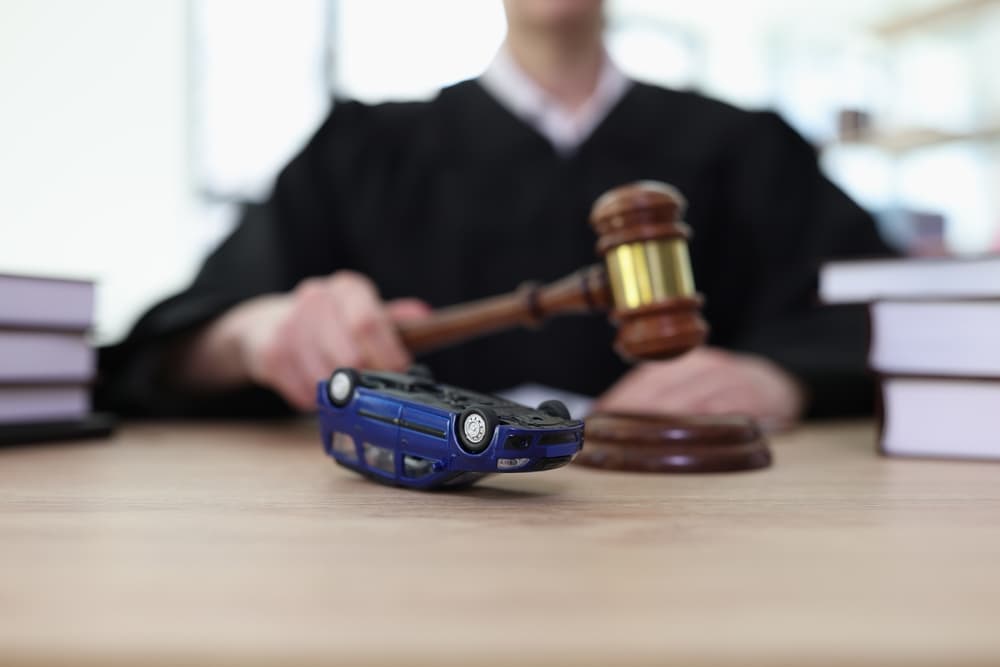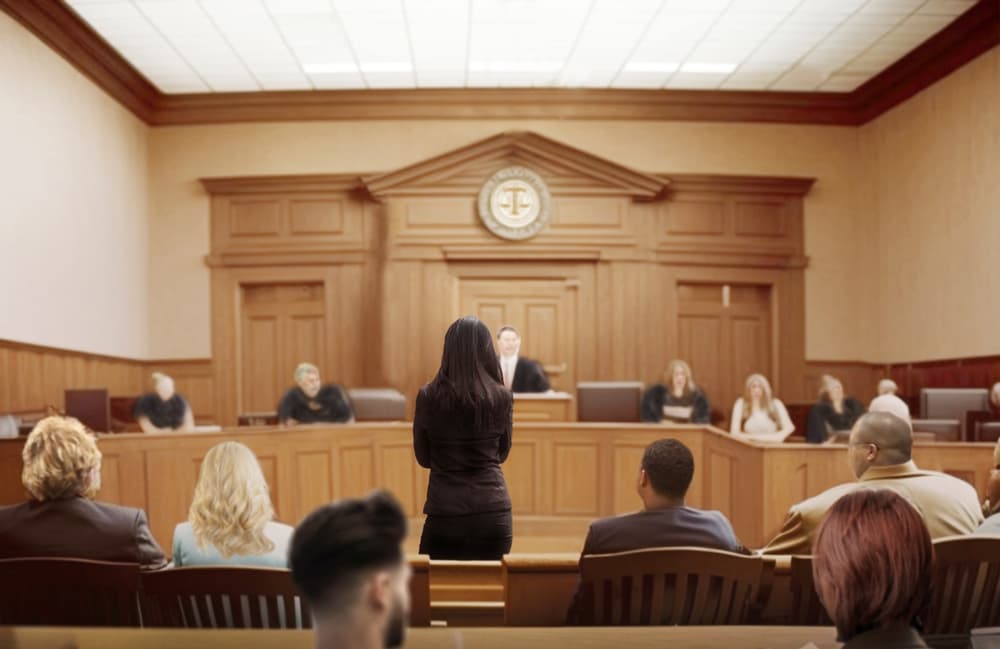After a car accident, you may wonder if your claim will end up going to court. The truth is that most car accident claims settle out of court through negotiations between the parties involved and their insurance companies. However, some cases do make it all the way to a courtroom trial.
In this blog post, we'll explore how often car accident claims actually go to court, what factors can increase the likelihood of a trial, and what you should expect if your case ends up in front of a judge and jury. Reach out a seasoned car accident lawyer for legal help.
Most Settle Out of Court

According to estimates, somewhere between 95 to 96 percent of all personal injury claims, including car accident cases, are settled before ever reaching a courtroom trial. Insurance companies and defendants usually want to avoid the extra time, expense, and uncertainty of a trial if possible.
Both sides often find it advantageous to negotiate an out-of-court settlement agreement that is acceptable to everyone involved. This allows the defendant to pay less than if they lost at trial, while the plaintiff gets compensated faster than waiting for a trial to conclude.
When Do Car Accident Claims Go to Court?
While most car accident claims are settled, there are some situations that increase the chances of a case going all the way to trial:
Liability Is Disputed

One of the most common reasons a car accident claim ends up in court is when there is a significant disagreement between the parties over who was at fault for causing the accident.
If both sides contest liability, they may feel confident that they can prove their version of events and establish the other party’s negligence.
Some key situations where liability tends to be disputed include:
- Accidents with no independent witnesses besides the drivers
- Cases where both drivers were violating traffic laws
- Crashes involving pedestrians, bicyclists, or other non-motorists
- Unclear or contradictory evidence about signaling, right-of-way, etc.
- Commercial truck accidents where the employer's liability is at issue
- Hit-and-run incidents where the other driver flees the scene
- Accidents caused by vehicle defects, road hazards, or other third-party factors
When the facts surrounding how the accident occurred are highly disputed, it's very difficult for the parties to agree on a settlement. The plaintiff will demand maximum compensation based on their version. The defendant will only offer a lower amount they feel is appropriate based on their perceived lack of fault.
Rather than risk getting nothing or overpaying at settlement, both sides may gamble on their ability to convince a judge or jury of who was truly liable. This increases the chances of an eventual trial unless the evidence becomes indisputably clear through further investigation.
Damages Are Complicated
In addition to disputed liability, car accident cases involving catastrophic injuries and complex damage claims are also more likely to require a trial for resolution. When future economic damages like ongoing medical costs and lost earnings potential are difficult to calculate, plaintiffs and defendants often have vastly different evaluations.
For example, an accident victim suffering paralysis or a traumatic brain injury may need a lifetime of future care and assistance. Projecting those costs 20, 30, or 40 years into the future while accounting for factors like life expectancy and future medical inflation can lead to huge discrepancies in valuing the claim.
Compounding the situation, the more severe the injuries, the higher the potential non-economic damages like pain and suffering. These are nearly impossible to assign a precise dollar figure to.
An accident with "mild" injuries may only get a small non-economic award. One with permanent impairments and disfigurements could justify a multi-million dollar non-economic payout.
The difficulty in agreeing on a fair settlement value when future economic damages and subjective non-economic costs are so high often forces these catastrophic injury cases to court.
Each side will make arguments based on their own expert witnesses and methodologies for calculating damages, with a judge or jury left to determine the appropriate amount.
Policy Limits Are Insufficient
Another factor that pushes car accident cases toward a trial is when the defendant's insurance policy limits are insufficient to fully compensate for the damages being claimed. In these situations, satisfactory settlement negotiations often stall because the insurance company simply doesn't have enough coverage to offer an adequate payout.
If it becomes clear that the plaintiff's damages from medical bills, lost wages, property damage, and pain and suffering will exceed the maximum they can recover from the defendant's insurance policy, the only way to potentially get full compensation is by going after the defendant's personal assets through a court judgment.
However, taking that path involves significant financial risk for the plaintiff. They may ultimately be awarded less than the insurance policy limit if they lose at trial against a defendant with limited personal wealth and assets to pursue.
As a result, many automobile accident lawsuits that appear to involve damages exceeding policy limits will still go to trial. The plaintiff is basically betting that they can not only establish the defendant's liability, but also convince a judge or jury to award them a judgment large enough to justify pursuing the defendant's personal assets and assets.
Parties Won't Compromise
In some instances, the failure to settle a car accident claim out of court has nothing to do with factual disputes over liability or damages. It simply comes down to one or both parties refusing to compromise from their entrenched settlement positions.
For example, the defendant may have a valid defense but still receive a settlement offer from the plaintiff. Rather than paying any amount whatsoever, even a relatively low sum, the defendant may decide it's worth the risk of a trial where they could owe nothing if victorious.
On the flip side, the plaintiff could have a fairly valued settlement offer on the table but decides to decline and instead gamble on potentially getting an even larger award from a sympathetic judge or jury at trial.
Overconfidence in one's case, personal animosity between parties, or simply an unwillingness to make any concession can cause negotiations to fall apart over what may seem to neutral parties as relatively minor dollar differences. When neither side will blink first by compromising, the impasse virtually guarantees a courtroom battle.
The involvement of outside interests like insurance companies can also negatively impact the willingness to settle. If an insurer is dragging its feet and refusing to make any reasonable offers, a plaintiff may need to file a lawsuit and proceed to trial to compel a better settlement in court.
The Case Involves Unique Circumstances
Finally, even when liability is clear, and damages appear to have a straightforward value calculation, car accident cases involving highly unique factual circumstances or unresolved legal issues tend to get routed to a courtroom trial rather than settled privately.
Most automobile accident injury claims tend to follow an established framework for investigating fault, evaluating damages, and resolving cases through settlement or trial when needed. However, truly one-of-a-kind situations with no clear precedent for how to rule or assess value complicate things.
For instance, a car accident lawsuit may be the first of its kind to deal with an emerging issue like liability for self-driving car technology failures. Without existing case law and legal precedents to rely on, the parties may decide settling is too risky and choose to let a judge and jury weigh in through a new trial.
Other examples of unique circumstances that may force an auto accident case to court include:
- Wrecks caused by unexpected road hazards and design defects
- New interpretations of traffic laws being argued by the parties
- Unfamiliar issues around owner liability for commercial vehicles
- Novel medical malpractice claims for improper post-accident treatment
- Cutting-edge biomechanics and accident reconstruction techniques being debated
- Recent state law changes that need clarification through new court rulings
In these types of cases, the stakes are simply too high for one party to compromise and settle based on conflicting assumptions of how responsibility should be assigned or damages valued.
Going through a full trial then becomes the only way to establish new legal precedents for how similar unique car accident claims should be handled going forward.
So, while avoiding trial and settling out of court is routine, cases where key facts are hotly disputed, injuries are catastrophic, insurance is insufficient, negotiation stances are uncompromising, or legal territory is uncharted frequently find themselves in front of a judge and jury instead.
Hire an attorney experienced in both settlement negotiations and courtroom trials when these complicating factors arise.
What Happens If a Car Accident Case Goes to Court?
If your car accident claim does make it all the way to a trial, here's a general overview of what you can expect:
1. The Complaint

The first step if your car accident case goes to court is for your lawyer to file a formal complaint against the defendant. This legal document initiates the lawsuit and lays out the key allegations.
The complaint will:
- State that the defendant was negligent in causing the accident
- Describe how their actions (or inactions) violated the duty of care they owed to other drivers
- List all of the specific damages you are seeking compensation for
This includes economic damages like medical bills, lost wages, and property damage costs, as well as non-economic damages for your pain, suffering, emotional distress, and loss of enjoyment of life.
By filing the complaint, you officially put the defendant on notice that you are taking legal action, and the court now has jurisdiction over the matter. The defendant will then have an opportunity to respond with their own answer to the allegations.
2. The Discovery Process
Once the lawsuit is underway, the next major step is the discovery phase. This is a crucial pre-trial stage where each side has the opportunity to gather evidence, facts, and information about the other's case.
Some of the key elements of the discovery process include:
- Interrogatories: Written questions that each party must answer under oath
- Document Production: Requesting and exchanging relevant documents, records, bills, etc.
- Depositions: Sworn testimony where witnesses are questioned by opposing counsel
- Requests for Admissions: Statements that one party must admit or deny
- Independent Medical Exams: Physical evaluations of injuries by third-party experts
The discovery phase allows you and your attorney to build the strongest possible argument proving the defendant's negligence and the damages you have incurred. It also forces the other side to turn over any evidence that could undermine their defense.
3. Negotiation Attempts

Even after a lawsuit has been officially filed, the parties involved will likely continue trying to reach an out-of-court settlement through negotiations. In fact, the door remains open for a potential compromise right up until a trial begins.
There are a few reasons why negotiating may continue:
- New evidence emerges during discovery that strengthens or weakens each side's case
- One or both parties may want to avoid the costs, time, and uncertainty of a trial
- The judge may order the lawyers to participate in court-supervised settlement conferences
- Mounting legal fees could motivate settling to avoid additional expenses
If negotiations prove successful at this stage, the case can be dismissed after a settlement agreement is finalized. But if neither side will budge from their positions, the matter will then proceed to an actual trial in front of a judge and jury.
4. The Trial
If all settlement attempts break down, your car accident case may go to trial.
The complicated trial process can generally involve:
- Jury Selection: Screening and selecting an impartial group of jurors
- Opening Statements: Each lawyer's opportunity to outline the key facts to the jury
- Witness Testimony: Examination and cross-examination of any witnesses with knowledge of the case
- Presentation of Evidence: Submitting exhibits, photos, videos, documents, etc. as proof
- Closing Arguments: The final chance for lawyers to sway the jury to their side
- Jury Deliberation: The jury privately discusses and weighs all the evidence to reach a verdict
- Verdict Reading: The jury foreperson announces the official decision in court
Trials can last anywhere from a few days for simple matters to several weeks or more if the case is very complex. Having an experienced trial lawyer representing you is the key to effectively presenting your case and poking holes in the defense's arguments.
5. The Verdict
The ultimate decision in a car accident trial rests with the jury.
After weighing all the evidence and testimony presented by both sides, the jurors must reach a unanimous verdict deciding two key issues:
- Was the defendant negligent and, therefore, liable for the accident? This means their actions or failure to act fell below the duty of reasonable care they owed to others on the road.
- If the defendant is liable, what amount of compensation is the plaintiff owed for their economic damages like medical bills and lost wages, as well as non-economic damages for pain, suffering, etc.?
If the jury finds the defendant negligent, they will award you a compensatory amount intended to make you whole again after the accident and injuries. On the other hand, if they decide the defense is not liable, you may not recover any damages.
6. Appeals
In some situations, the losing party may decide to appeal the final verdict from the trial if they believe there were errors in how the case was conducted or decided.
Some potential grounds for an appeal include:
- Improperly admitted or excluded evidence that unfairly impacted the case
- Jury instructions from the judge that misstated the law
- Rulings or procedures by the judge that prevented a fair trial
- A verdict that goes against the established facts and weight of the evidence
- Juror misconduct that violated the defendant's Constitutional right to an impartial jury
- New evidence was discovered after the trial that could have changed the outcome
By filing an appeal, the losing side asks a higher court to review the record from the original trial to determine whether any reversible errors were made. If so, the appeals court may order a new trial or even rule in favor of the appealing party.
However, the appeals process is very difficult, with a high legal bar to overcome. You need skilled appellate lawyers if you find yourself in this situation after an initial trial over your car accident case.
While most car accident claims settle out of court, those that do proceed to a trial and potential appeal can take a long time to fully resolve. Understanding all of the key stages can prepare you if your case follows that rarer path.
Call an Experienced Car Accident Lawyer Today
After a car accident, you need strong legal representation to protect your rights and fight for the full compensation you deserve. Don't try to handle the claims process or go up against insurance companies on your own.
Contact a Fairfax personal injury law firm today for a free, no-obligation consultation about your case.

